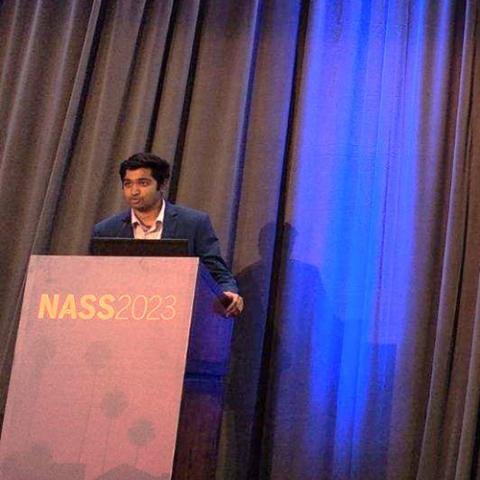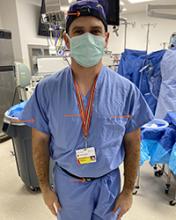Case Western Reserve University School of Medicine student Nikhil Vasireddi’s research is significantly relevant to his orthopedic surgeon mentors' health and well-being. Vasireddi recently presented research on a high incidence of musculoskeletal disorders affecting orthopedic surgeons at the North American Spine Society Conference.
“We discovered that nearly 80% of the surgeons experience some kind of work-related musculoskeletal injury,” said Vasireddi. “The rates of injury are often higher than some athletes and are indicative of physically demanding careers like construction.”
Unlike previous research in this area, Vasireddi’s study uses wearable technology to gather data.
For the study, participating surgeons wore five sensors—one on each arm, the chest, the head and the belt line. An accelerometer and gyrometer within the sensors calculate tilt and orientation in space. The head and waist sensors provide data on flexion, extension and rotation, while the arm sensors show shoulder abduction, adduction, internal and external rotation. The EKG chest sensor monitors the heart and provides data on calories burned and various stress metrics.
Jacob Calcei, MD, one of Vasireddi’s mentors and a participant in the study says Vasireddi’s research plan and follow-through are impressive for a medical student.
“He is a true self-starter,” said Calcei. “This current research project has the potential to improve physician well-being, which in turn allows us to provide the best care for our patients.”
Vasireddi and fellow researchers used the data to identify which surgical steps pose the highest risk for injury—and outlined targeted interventions such as new instruments and tools to increase ergonomic safety for surgeons.
“Our whole goal is to understand the occupational hazards that surgeons experience to promote career longevity and help them continue delivering exemplary patient care,” said Vasireddi.
Vasireddi will share his research at the Mid-America Orthopaedic Association conference in April.
Additionally, Vasireddi is studying athletes' usage of selective androgen receptor modulators and recently earned the Eastern Orthopedic Educational Foundation Joshua A. Baumfield, MD Travel Grant for that work.



